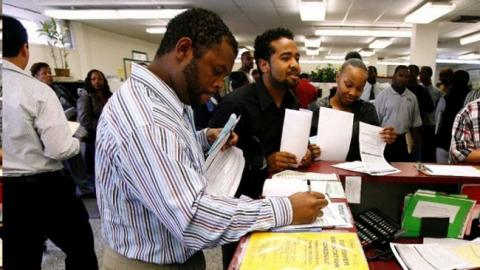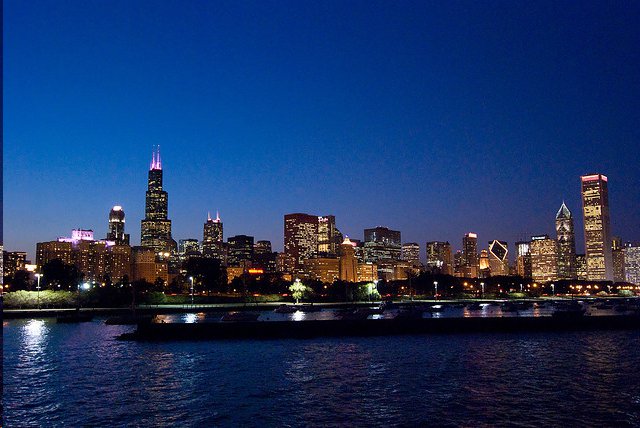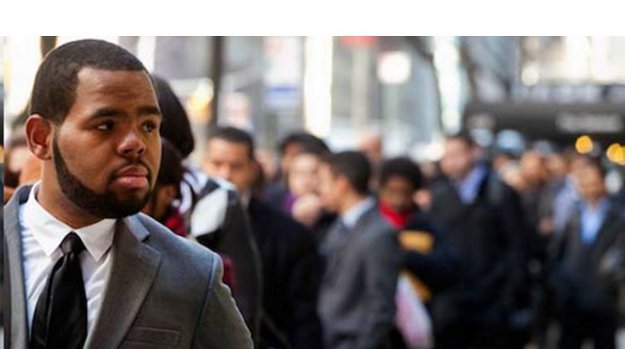On Chicago’s West Side, No Rebound From the Recession

From the Chicago Reporter and republished by our content partner New America Media:
Quaid Stephens can remove mold, asbestos and lead paint from buildings. He can even drive a forklift. He has nine training certificates, including one for CPR, but he still can’t find a job.
At a recent job fair at the Austin Branch Library on Chicago’s West Side, Stephens, who was released from prison more than a year ago, earnestly filled out job applications.
“It’s like you want me to go back on the corners to sell drugs, pick the pistol back up and rob and do what I need to do to make the ends meet,” said the 44-year-old who was in federal prison for 12 1⁄2 years for bank robbery. “I don’t want to do that. I want to earn an honest living.”
His story isn’t that unusual in a pocket of the city where the unemployment rate remains stubbornly high, the product of a perfect storm of issues – disinvestment, disappearing manufacturing jobs, poor public schools and high incarceration rates.
While the overall unemployment rate in Chicago has declined since the recession ended, the rate in African-American communities has remained high. The citywide unemployment rate was 8.4 percent in 2014, but it has been well into the double digits in neighborhoods like Austin, North Lawndale, Englewood and Garfield Park, according to a Reporter analysis.
The interconnection between unemployment and incarceration has made these communities least likely to share in the economic recovery, experts say. Like Stephens, who spent a portion of his youth in West Garfield Park, more than half of all men released to Chicago from Illinois prisons return to a handful of economically depressed neighborhoods, including many on the West Side.

***
Historically, black joblessness has always been twice that of white unemployment, said Michael Dawson, a political science professor at the University of Chicago.
“African-American employment has been bad for almost half a century,” he said. “The recession can make it worse. Occasionally, it can get a little better, but it’s been very bad due to a number of different reasons. And these reasons tend to be structural – and there are not a lot of reasons for optimism in the immediate future.”
That lack of optimism stems from the continued loss of manufacturing jobs and the decline of public-sector or government jobs, which were an important source of employment for blacks. These jobs, Dawson said, have been replaced with low-wage service jobs that don’t have the same benefits, wages and security that came with manufacturing and public-sector jobs.
Today, the growth of high-end service sector jobs in banking, finance, law and technology — industries in which blacks are sorely underrepresented and ill-prepared — are fueling the city’s economic fortunes.
Mayor Rahm Emanuel has pushed to develop and improve downtown infrastructure to lure big name corporations like Motorola Solutions and ConAgra Foods, and the jobs that came with them to the city’s business center. However, those jobs didn’t necessarily go to people in communities where they were most needed.
Austin exemplifies the divestment left in the wake of the decline of manufacturing, says Charles Perry of the Westside Health Authority, which provides re-entry and employment services. The agency places between 600 and 800 people a year in jobs out of the 12,000 seeking services. Like Stephens, 90 percent of them have criminal records and lack a high school diploma or a GED.
Stephens received his GED in prison, where he completed four of his training certificates. Before he started cycling in and out of prison for crimes from drug dealing to car theft, he had held seven jobs – all unskilled.

***
The West Side was once teeming with manufacturing companies like Brach’s Candy and Western Electric. But as white flight took root, sped up by the riots following the Rev. Martin Luther King Jr.’s assassination in 1968, the jobs left.
“If you go up to Cicero, you see all these old factories. Well, they moved out and nobody moved in. Out went the jobs, in came unemployment,” Perry said.
What replaced them were vacant storefronts or churches and the few businesses that exist are immigrant-owned, family-run and don’t hire from the community, he said.
“When you don’t have dollars circulating in your community, it is impossible to have employment,” Perry said.
And with the city losing manufacturing jobs to the suburbs, transportation now becomes a barrier to employment, said Mark Sanders of the North Lawndale Employment Network. “A large percentage of their paychecks goes just to getting back and forth from work,” said Sanders, NLEN’s director of re-entry, policy and advocacy. NLEN is a workforce development organization that provides training and job placement services to ex-offenders and other people who are hard to employ.
At one point, Stephens found seasonal work at a warehouse in Melrose Park. He took the CTA train to Harlem Avenue, where he caught a regional Pace bus to work. His family gave him $33 for a weekly bus pass.
Those lucky enough to find a job through temp agencies face sporadic employment. Oftentimes ex-offenders get caught up in this vicious cycle. They may land a “temp to perm” job, but a company may use their criminal record to keep them from becoming a permanent hire, Sanders said.
It’s an end run around both a city and state law prohibiting private employers from discriminating against people with criminal backgrounds. Both laws, which took effect last year, prevent employers from inquiring about felony convictions on job applications. The law prohibits employers from checking an applicant’s background until selected for an interview.
“It’s not just ‘Ban the Box,’ even though that is what they call it. It’s actually move the box because at some point they will do a background check,” Sanders said.
Stephens discovered that the hard way. He had three promising job leads until his background check. He said, “It’s like after they do the background check, I’m dead.”
***
Black ex-offenders face double discrimination based on their race and their criminal record, said Devah Pager, a professor of sociology and public policy at Harvard University who has written extensively about the effects of incarceration.
Even without a criminal record and with competitive skills, black people face hiring discrimination. Pager conducted a study in 2003 in Milwaukee that showed that white people with a criminal record were more likely to be hired than black people without a record.
Mass incarceration reinforces broad stereotypes about all African-American men and affects hiring practices, she said.
“It kind of reinforces the association between race and criminality in the minds of employers, and I think that contributes to forms of direct discrimination against black men in hiring situations,” said Pager, the author of “Marked: Race, Crime, and Finding Work in an Era of Mass Incarceration.”
Pager said the official unemployment figures don’t capture the real employment picture in black communities.
“When millions of people, and disproportionately people of color, are being removed from those statistics, it gives us a biased sense of the health of our economy,” Pager said. “If all the people who are currently imprisoned were considered part of the labor force statistics, unemployment rates would be a couple of points higher, and the racial disparities would look larger.”
For Stephens, the issue is simple. "I need a job," he said.
This is the first in a series of stories examining unemployment in the African- American community.
From the Chicago Reporter and republished by our content partner New America Media






























































































































































































































































































































